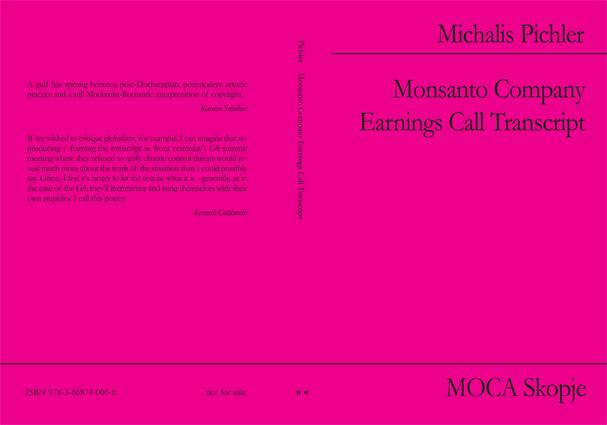Museum of Contemporary Art Skopje
October 1 - 22 2010
Description of project:
"European and international artists are asked to present works in the exhibition The apparatus of life and death. In fact, SEAFair 2010 will convey the story of artists attempting to navigate through the maize of the newly constructed global bio-political apparatus, in a changing social matrix, in which the rules are just being set (new rules being established and old rules which are vanishing). In the unstable and confused process, unwanted features of the murky waters slowly start showing up with some the participants swimming nicely in them whereas others are maladjusted.
The artists in the exhibition The apparatus of life and death will present an array of approaches — from the humorous and playful to the deadly serious — regarding the way we think about the origins of life, the scale and dimensions of living matter, to relationships with nourishment, death, fashion and appearance.
Vilém Flusser claimed that apparatuses are generally based on technical and political programs, which are highly ideological and always biased. He also stressed that there is no value-free technology - especially not when it comes to the production of images, meaningful surfaces.
We are becoming witnesses and participants in the creation of the bio-political apparatus, presently being formed with all of its paraphernalia. Power relations are being established, and bio-political conflicts are accelerating in real and virtual worlds, involving governments, NGOs and corporations, over gene technologies practice and regulations, stem cell research, bioethics, and bio-patenting. Biotechnologies are also appealing to the general public, and we can detect a rising interest in DNA profiling, personal genomics, bio-data gathering, and lately genetic social networking. One of its outcomes is the creation of a genetically-based value system. We may suspect that another of its outcomes may be the development of appealing forms of neo-eugenics in the 21st century, and paradoxically the creation of new utopian communities.
In this context, it seems clear that the mirroring of fundamental ideologies has social and economic parameters that we need to decipher. It has to become the role of philosophy (including ethics as a branch of philosophy), criticism and art to examine the structure of the apparatus and to determine how its construction changes the reality we live in.
Current theoretical development in bio-philosophy and bio-politics also connects us to the thinking of Michel Foucault, Giorgio Agamben, Hardt&Negri, and Roberto Esposito.
Artistic and cultural research in the area of biotechnology has questioned established philosophic beliefs, questioned commercial and ethical practices, and proposed new ways of looking at life and society. In practical terms this aesthetisation of the bio-political apparatus in the forming is quite significant. On one level the artists are critics of developments in biotechnology, and on other level collaborators, as many of the artworks in this field suffer from looking at biotech arts through what is basically positivist lenses, which essentially contributes to the non-critical acceptance and formation of the bio-political apparatus." Melentie Pandilovski
Invited Artists:
Roy Ascott (UK), Irena Paskali (Macedonia/Germany), Zoran Todorovic ( Serbia), Stelarc (Australia/UK), Zbignew Oksiuta (Germany), FoAM (Belgium), Nina Kovacheva (France/Bulgaria), Calin Dan (Holland), Maja Sokolova (Germany/Macedonia), Adam Zaretsky (USA), Michalis Pichler (Germany), UBERMORGEN (Hans Bernhardt and Lizvix, Switzerland/Austria), Petko Dourmana (Bulgaria), Ile Cvetkoski (Austria/Macedonia), Tissue Art & Culture Project (Oron Catts and Ionat Zurr, Australia), Lei Cox (England/Norway), Andre Brodyk (Australia), Heath Bunting (UK), Eduardo Kac (Brazil/USA), Oliver Ressler (Austria), Kira O’Reiley (England), Effie Halivopoulou (Greece), George Gessert (USA), Jenni Marketou (Greece).
